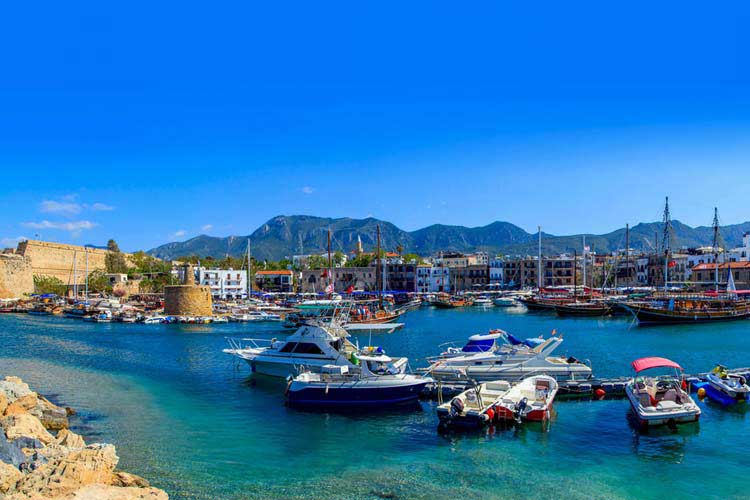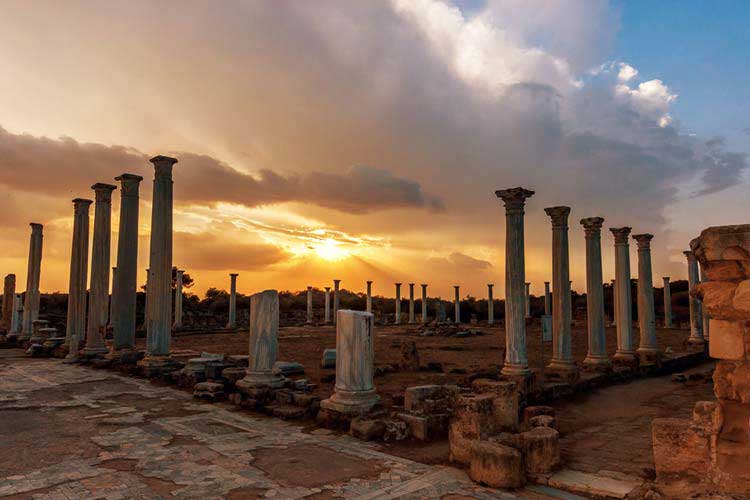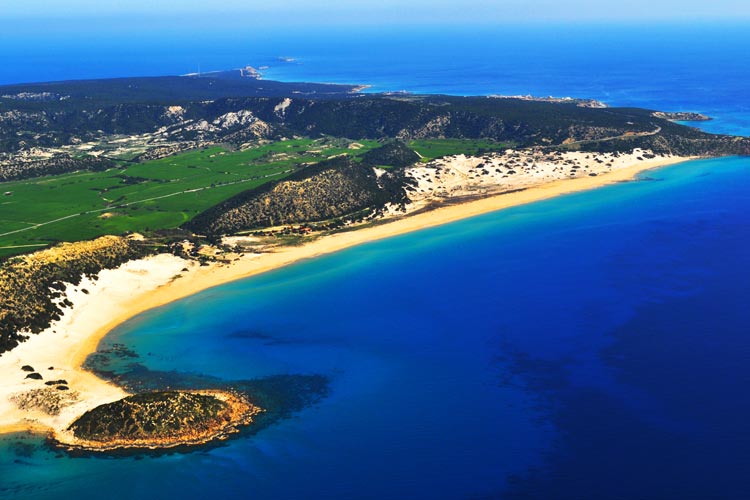The strategic location of Cyprus in the eastern Mediterranean has had an overwhelming influence on the history of North Cyprus ever since the first Neolithic settlers around 6500 B.C. These arrived from southern Turkey, and the coastal regions of Syria and Palestine and many formed settlements in the northern region at Zafer Burnu, Trulli, just east of Girne, Alsancak, Ambelikou near Lefke and others.
The growth of seafaring during the Bronze Age (ca 2,500BC) brought a new wave of immigration to the island and slowly increasing prosperity. Glazed beads from Egypt, pottery from Syria, tools and weapons from Crete found near Lapta are all evidence of the trading links established in this period.
The exploitation of the significant copper deposits brought further prosperity in the Middle Bronze Age and Lapta, heavily involved in the copper industry, became an important population centre. Internal dissension led to enmity between east and west and saw the growth of larger settlements in the east and the appearance of fortresses.
In the later period, ca 1650 - 1050 B.C., Lapta declined and Enkomi developed as a major trading centre only to decline by the 11th century giving way to Salamis built around a natural harbour.
Around 1400BC, when the Mycenaean Empire declined, many migrated to Cyprus bringing new skills and the concept of independent city kingdoms. By the 9th century, the Phoenicians, attracted by the islands wealth of raw materials, started to settle adding to the nations racial mix. This period witnessed the division of the island into several kingdoms including Salamis, Ledroi near Lefkosa and Soli. and the eventual domination by Egypt.
After throwing off the Egyptian yoke in 545 B.C., Cyprus voluntarily submitted to Persian control and remained so until Alexander the Great's victory over the Persians. Following Alexander's death, the island was fought over by two of his successor generals changing hands several times until 294BC when Ptolemy I Soter took control. For the next 250 years it enjoyed relative peace and prosperity as part of the Egyptian kingdom.
In 58BC the island was annexed by the Romans and remained part of the Roman Empire until A.D. 395. The Romans were intent on draining the island of its wealth but they did leave behind a significant legacy in roads and public buildings in places like Salamis and Soli. Trade flourished with an impressive list of major exports: copper, silver, iron, wine, wheat and oil.
Christianity flourished very early on Cyprus. St Barnabas, born in Salamis of Jewish parents, returned to the island with St Paul in 46AD and made many converts to Christianity. Barnabas was later martyred in Salamis.
With the decline of the Roman Empire around 395AD, Cyprus naturally became part of the Byzantine Empire ruled from Constantinople. The island enjoyed a further period of peace and prosperity when churches and monasteries were built all over the island. By the seventh century, Christian Byzantium was under threat from the Muslim east. Arab raids continued for 300 years and not until 965 were the last Arabs expelled. In 1184 Cyprus achieved independence under the brutal rule of Isaac Comnenos, a junior member of the imperial Byzantine family. His oppression didn't last too long as he crossed swords with Richard I of England and lost Cyprus to European rule for centuries. The Knights Templars took control briefly before the island was handed to Guy de Lusignon as compensation for the loss of his Kingdom of Jerusalem.
After the division of the island by military intervention in 1974, the Turkish population was confined to the north and the Greeks to the south. These two communities are divided by the United Nations controlled Green Line. This military intervention lead to the northern sector, now called the Turkish Republic of North Cyprus. The high tensions of the early years have subsided, and more recent history is punctuated with talks to find a way to bring unity to this beautiful island. Each failure brings them a step closer, and each initiative at talks brings new hope. Peace has settled over the whole island, and both Turkish north and the Greek south are safe and rewarding holiday destinations. Turks born and bred on Cyprus regard themselves as Turkish Cypriots, which distinguishes them from Turks brought in from Turkey to boost the population after 1974.
Read information about North Cyprus location.

Cyprus' most popular holiday destination...

Beautiful beaches and ancient sites...

Explore Beaches of North Cyprus...